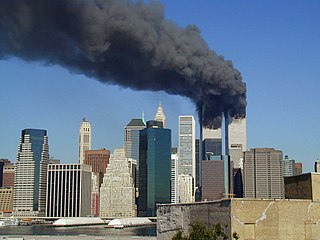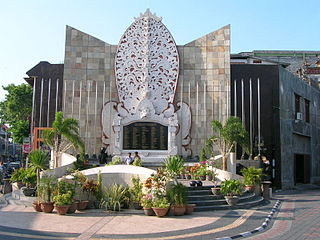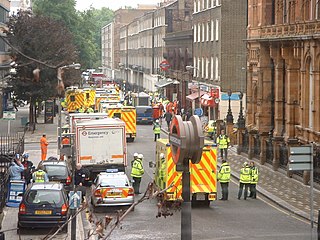
United Nations Security Council Resolution 1373, adopted unanimously on 28 September 2001, is a counter-terrorism measure passed following the 11 September terrorist attacks on the United States. The resolution was adopted under Chapter VII of the United Nations Charter, and is therefore binding on all UN member states.

United Nations Security Council resolution 1566, adopted unanimously on 8 October 2004, after reaffirming resolutions 1267 (1999), 1373 (2001) and 1540 (2004), the Council condemned terrorism as a serious threat to peace and strengthened anti-terrorism legislation.
The Counter-Terrorism Committee is a subsidiary body of the United Nations Security Council.

United Nations Security Council resolution 1189, adopted unanimously on 13 August 1998, after expressing its deep disturbance at the bombings in Nairobi, Kenya, and Dar es Salaam, Tanzania on 7 August 1998, the Council strongly condemned the terrorist attacks and called on countries to adopt measures to prevent further incidents.
United Nations Security Council resolution 1269, adopted unanimously on 19 October 1999, after expressing concern at the increasing number of acts of international terrorism, the Council condemned terrorist attacks and called upon states to fully implement anti-terrorist conventions. It was the first time the Security Council had addressed terrorism in a general manner, though it did not define what constituted terrorism.

United Nations Security Council resolution 1368, adopted unanimously on 12 September 2001, after expressing its determination to combat threats to international peace and security caused by acts of terrorism and recognising the right of individual and collective self-defense, the Council condemned the September 11 attacks in the United States.
United Nations Security Council Resolution 1377 was adopted unanimously at a ministerial meeting on 12 November 2001; the Council adopted a declaration concerning efforts to eliminate international terrorism.
United Nations Security Council resolution 1390, adopted unanimously on 16 January 2002, after recalling resolutions 1267 (1999), 1333 (2000), 1363 (2001), 1368 (2001), 1373 (2001) 1378 (2001) and 1383 (2001) concerning the situation in Afghanistan and terrorism, the Council imposed further sanctions on Osama bin Laden, Al-Qaeda, the Taliban and others associated with them.

United Nations Security Council resolution 1438, adopted unanimously on 14 October 2002, after reaffirming the principles of the United Nations Charter and Resolution 1373 (2001), the Council condemned the bombings in Bali, Indonesia.
United Nations Security Council resolution 1440, adopted unanimously on 24 October 2002, after reaffirming the principles of the United Nations Charter and Resolution 1373 (2001), the Council condemned the hostage-taking at a theatre in Moscow, Russia, by Chechen militants.

United Nations Security Council resolution 1450, adopted on 13 December 2002, after reaffirming the principles of the United Nations Charter and resolutions 1189 (1998), 1269 (1999), 1368 (2001) and 1373 (2001), the Council condemned the attacks on Israeli targets in Kikambala and Mombasa, Kenya on 28 November 2002.

United Nations Security Council resolution 1455, adopted unanimously on 17 January 2003, after recalling resolutions 1267 (1999), 1333 (2000), 1363 (2001), 1373 (2001), 1390 (2001) and 1452 (2002) concerning Al-Qaeda, the Taliban and terrorism, the Council improved the implementation of measures against the groups. It was the first Security Council resolution adopted in 2003.
United Nations Security Council resolution 1456, adopted unanimously on 20 January 2003 in a meeting at the foreign minister level, the Council adopted a declaration calling on all states to prevent and suppress all support for terrorism. The resolution did not define terrorism, but unlike other previous resolutions, mentioned human rights for the first time.
United Nations Security Council resolution 1526, adopted unanimously on 30 January 2004, after recalling resolutions 1267 (1999), 1333 (2000), 1363 (2001), 1373 (2001), 1390 (2001), 1452 (2002) and 1455 (2003) concerning terrorism, the Council tightened sanctions against Al-Qaeda, the Taliban, Osama bin Laden and associated individuals and groups.

United Nations Security Council Resolution 1963, adopted unanimously on December 20, 2010, after reaffirming resolutions 1373 (2001), 1535 (2004), 1624 (2004), 1787 (2007) and 1805 (2008), the Council decided to continue the Counter-Terrorism Committee Executive Directorate (CTED) under the guidance of the Counter-Terrorism Committee (CTC) for another three years until December 31, 2013.

United Nations Security Council resolution 1611, adopted unanimously on 7 July 2005, after reaffirming the principles of the United Nations Charter and resolutions 1373 (2001) and 1566 (2004), the Council condemned the 7 July 2005 London bombings.

United Nations Security Council resolution 1617, adopted unanimously on 29 July 2005, after recalling resolutions 1267 (1999), 1333 (2000), 1363 (2001), 1373 (2001), 1390 (2001), 1452 (2002), 1455 (2003), 1526 (2004) and 1566 (2004) concerning terrorism, the Council renewed sanctions against Al-Qaeda, the Taliban, Osama bin Laden and associated individuals and groups for a further seventeen months.

United Nations Security Council Resolution 1735, adopted unanimously on December 22, 2006, after recalling resolutions 1267 (1999), 1333 (2000), 1363 (2001), 1373 (2001), 1390 (2001), 1452 (2002), 1455 (2003), 1526 (2004), 1566 (2004), 1617 (2005), 1624 (2005) and 1699 (2005) on terrorism, the Council approved measures to improve the identification and control of terrorists.
United Nations Security Council Resolution 2199 was unanimously approved on 12 February 2015 to combat terrorism. Drafted by Russia, its legally binding provisions gave the fifteen nations of the United Nations Security Council authority to enforce decisions with economic sanctions. The resolution, in particular, emphasized "the need to combat by all means, in accordance with the Charter of the United Nations and international law, [...] threats to international peace and security caused by terrorist acts".
The UN Counter-Terrorism Implementation Task Force (CTITF) was an instrument designed to roll out the UN Global Counter-Terrorism Strategy.











